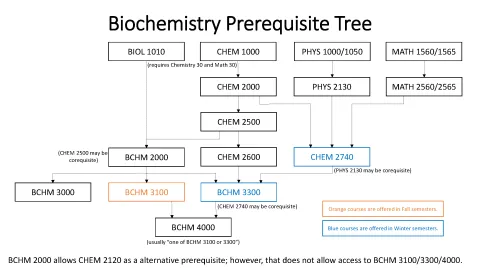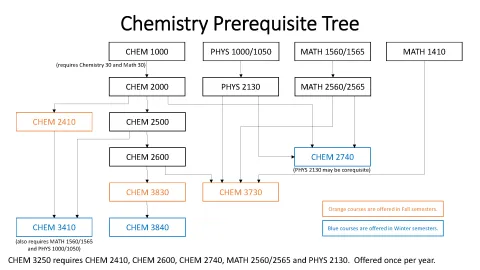Courses Offered in Chemistry & Biochemistry
The Department of Chemistry & Biochemistry offers a wide range of courses. Some courses are offered every semester, while others rotate on a yearly or every other year rotation.
The comprehensive list of courses below are not offered every semester. Please always refer to the current year's academic calendar for the most accurate list of courses offered. Refer to the Bridge for current semester offerings and to register for courses.
Biochemistry

Credit hours: 3.00
Contact hours per week: 3-0-0
Chemistry of biomolecules including proteins, nucleic acids, carbohydrates and lipids.
Prerequisite(s): One of Chemistry 2120 or Chemistry 2500
Recommended Background: Biology 1010
Lib Ed Req: Science
Credit hours: 3.00
Contact hours per week: 3-0-0
The science of human nutrition based on some elementary principles of Chemistry and Biochemistry. Nutritional requirements, the function and metabolism of nutrients and the practical means for achieving adequate nutrition are emphasized. The relationship among social and economic issues, nutrition, food production and distribution will be discussed.
Prerequisite(s): One of Chemistry 30, Chemistry 0500, or Chemistry 0520
Lib Ed Req: Science
Credit hours: 3.00
Contact hours per week: 3-3-0
Chemistry of proteins and nucleic acids with an emphasis on experimental techniques and the relation of structure to function.
Prerequisite(s): Biochemistry 2000 AND Chemistry 2600
Corequisite(s): Chemistry 2410
Lib Ed Req: Science
Credit hours: 3.00
Contact hours per week: 3-3-0
Chemistry of carbohydrates and lipids and the metabolism of these and other cellular constituents. Energy transduction associated with catabolism and synthesis.
Prerequisite(s): Biochemistry 2000 AND Chemistry 2600
Corequisite(s): Chemistry 2740
Lib Ed Req: Science
Credit hours: 3.00
Contact hours per week: 3-0-0 or 3-3-0 or 3-0-1
Advanced subjects in Biochemistry, drawing on the expertise of the instructor.
Prerequisite(s): Will be specified (including any recommended background) for individual offerings, but will normally include one of Biochemistry 3100 or Biochemistry 3300
Note: This course may occasionally be offered with a laboratory when resources permit and the course theme is appropriate.
Credit hours: 3.00
Contact hours per week: 3-0-0 or 3-0-1
Recent and advanced experimental biochemical and biophysical techniques. Examination of experimental methods includes technical background, experimental design, data analysis and current applications of these methods in the scientific literature.
Prerequisite(s): One of Biochemistry 3100 or Biochemistry 3300
Equivalent: Biochemistry 4000 (Contemporary Methods in Biochemistry) (prior to 2017/2018)
Lib Ed Req: Science
Credit hours: 6.00
Contact hours per week: Variable
This is a research-oriented course in which students will conduct an original research project, report orally on the work, and submit a final report in the form of an Undergraduate Thesis. The Thesis, which will normally be submitted in both print and electronic forms, will be made publicly available.
Prerequisite(s): Fourth-year standing (a minimum of 90.0 credit hours) AND A cumulative GPA of 3.30 or higher AND One of Biochemistry 3100 or Biochemistry 3300
Note: Contact hours will vary. Students should be aware that this course involves regular contact with the Thesis Supervisor as well as considerable independent work. Faculty regulations require extensive preparatory work prior to registration, including the submission of a Thesis Proposal. Students interested in the Undergraduate Thesis option should therefore discuss the matter with potential supervisors at least several weeks prior to the registration deadline.
Chemistry

Credit hours: 3.00
Contact hours per week: 3-0-0
Selected subjects in Chemistry, with emphasis on material necessary as background preparation for Chemistry 1000. This course is intended for students with little or no background in Chemistry.
Recommended Background:
One of Chemistry 20 or Science 30 AND
One of Mathematics 30-1, Mathematics 30-2, Pure Mathematics 30, or Mathematics 0500
Equivalent:Chemistry 0520
Lib Ed Req: Science
Note:Credit for Chemistry 0500 will not normally be granted to those with Chemistry 30 or equivalent. Students may be able to take this course for credit with permission of the Department.
Credit hours: 3.00
Contact hours per week: 2-3-0
Introductory foundation in chemistry. Composition, structure, and properties of substances and the transformations that they undergo.
Prerequisite(s):Admission to the First Nations' Transition Program AND
Chemistry 20
Equivalent:Chemistry 0500
Lib Ed Req: Science
Credit hours: 3.00
Contact hours per week: 3-3-0
An introduction to the discipline and essential concepts of Chemistry.
Prerequisite(s):One of Chemistry 30, Chemistry 0500, or Chemistry 0520 AND
One of Mathematics 30-1, Pure Mathematics 30, Mathematics 0500, or Mathematics 0520
Recommended Background:
Mathematics 31 AND
Physics 30
Substantially Similar:
Chemistry 1110
Lib Ed Req: Science
Credit hours: 3.00
Contact hours per week: 3-3-0
A survey of general and organic chemistry with an emphasis on the life sciences.
Recommended Background:
One of Chemistry 30, Chemistry 0500, or Chemistry 0520 AND
One of Mathematics 30-1, Pure Mathematics 30, Mathematics 0500, or Mathematics 0520
Substantially Similar:
Chemistry 1000
Lib Ed Req: Science
Note:Chemistry 1110 cannot be used to meet the requirements for the major in Chemistry.
Credit hours: 3.00
Contact hours per week: 3-3-0
Continuation of the introduction to the discipline and advanced concepts of Chemistry.
Prerequisite(s):Chemistry 1000
Lib Ed Req: Science
Credit hours: 3.00
Contact hours per week: 3-3-0
Continued survey of organic chemistry with an emphasis on the life sciences.
Prerequisite(s):Chemistry 1110
Substantially Similar:
Chemistry 2500
Lib Ed Req: Science
Note:Chemistry 2120 cannot be used to meet the requirements for the major in Chemistry. Students who have credit for Chemistry 1000 and are interested in completing this course should contact the Department of Chemistry and Biochemistry.
Credit hours: 3.00
Contact hours per week: 3-0-0
A course designed for non-Chemistry or non-Biochemistry majors. The course will examine the history of basic chemistry and its impact on society. This will include energy, synthetic materials, pollution, consumer chemistry, drugs and other current topics of interest.
Lib Ed Req: Science
Note:Credit is not allowed for Chemistry 2310 subsequent to the completion of any other course in Chemistry.
Credit hours: 3.00
Contact hours per week: 3-0-0
An introduction to key figures and major discoveries throughout the history of chemistry. Topics include the origins of chemistry; the development of fundamental theories; the beginnings of organic chemistry; and the rise of inorganic, analytical, physical and industrial chemistry.
Prerequisite(s):One of Chemistry 30, Chemistry 0500, or Chemistry 0520 AND
Second-year standing (a minimum of 30.0 credit hours)
Lib Ed Req: Science
Credit hours: 3.00
Contact hours per week: 3-3-0
Principles of quantitative analysis: gravimetric and volumetric analysis; acid-base, complexation and oxidation-reduction titrations; statistical treatment of data.
Prerequisite(s):Chemistry 2000
Lib Ed Req: Science
Credit hours: 3.00
Contact hours per week: 3-3-0
An introduction to the chemistry of carbon-containing compounds. This course builds a foundation for the study of organic compounds by examining their structure, bonding and stereochemistry. Methods of structure determination and investigations of reaction mechanism are also introduced.
Prerequisite(s):Chemistry 2000
Substantially Similar:
Chemistry 2120
Lib Ed Req: Science
Note:Some familiarity with Calculus and Physics is recommended.
Credit hours: 3.00
Contact hours per week: 3-3-0
A continuation of Chemistry 2500 with an emphasis on the transformations of organic compounds and the mechanistic processes involved.
Prerequisite(s):Chemistry 2000 AND
Chemistry 2500
Lib Ed Req: Science
Credit hours: 3.00
Contact hours per week: 3-3-0
Basic theories of thermodynamics and kinetics with applications in chemistry, biochemistry, and the life sciences. The laboratory will emphasize experimental methods of physical chemistry, data handling and report writing.
Prerequisite(s):Chemistry 2000 AND
One of Mathematics 2560 or Mathematics 2565
Corequisite(s):Physics 2000
Lib Ed Req: Science
Credit hours: 3.00
Contact hours per week: 3-0-0
A survey of current developments in chemistry. Current research interests and recent applications of chemistry in industry. Specific topics will be presented each week by invited speakers and staff. Student presentations; effective searching of chemical literature and databases.
Prerequisite(s):Chemistry 2410 AND
Chemistry 2600 AND
Chemistry 2740 AND
One of Mathematics 2560 or Mathematics 2565 AND
Physics 2000 AND
Third-year standing (a minimum of 60.0 credit hours)
Lib Ed Req: Science
Note:Credit will only be given once for Chemistry 3250; however, Chemistry majors are encouraged to attend seminars offered in the context of this course.
Credit hours: 3.00
Contact hours per week: 3-3-0
Introduction to the major instrumental methods of analytical chemistry; atomic and molecular spectrophotometry; gas and liquid chromatography.
Prerequisite(s):Chemistry 2410 AND
Chemistry 2600 AND
Chemistry 2740 AND
One of Mathematics 2560 or Mathematics 2565 AND
Physics 2000
Lib Ed Req: Science
Credit hours: 3.00
Contact hours per week: 3-3-0
Principles of quantum mechanics and applications in chemistry; applications to molecular structure and spectroscopy. The computational laboratory includes both a computer algebra module in support of the theoretical developments and an introduction to ab initio quantum chemical calculations.
Prerequisite(s):Chemistry 2600 AND
Mathematics 1410 AND
One of Mathematics 2560 or Mathematics 2565 AND
Physics 2000
Corequisite(s):Chemistry 2740
Lib Ed Req: Science
CHEMISTRY 3830
Inorganic Chemistry I
Credit hours: 3.00
Contact hours per week: 3-4-0
Basic concepts of inorganic chemistry; bonding and symmetry; chemistry of the elements with an emphasis on main group elements and their inorganic and organometallic compounds. Laboratory experiments illustrate the lecture topics with an emphasis on chemical synthesis and characterization.
Prerequisite(s):Chemistry 2600
Lib Ed Req: Science
CHEMISTRY 3840
Inorganic Chemistry II
Credit hours: 3.00
Contact hours per week: 3-4-0
Chemistry of the elements with an emphasis on transition metals and their inorganic and organometallic compounds. Laboratory experiments illustrate the lecture topics with an emphasis on chemical synthesis and characterization.
Prerequisite(s):Chemistry 3830
Lib Ed Req: Science
Credit hours: 3.00
Contact hours per week: 3-0-0
In each offering, an area of chemistry including advanced topics in analytical, organic, inorganic, physical, and theoretical chemistry will be explored in depth.
Prerequisite(s):Third-year standing (a minimum of 60.0 credit hours) AND
Additional prerequisites will be specified, including any recommended background, for individual offerings, but will normally include all of Chemistry 2410 AND
Chemistry 2600 AND
Chemistry 2740 AND
One of Mathematics 2560 or Mathematics 2565 AND
Physics 2000
Credit hours: 3.00
Contact hours per week: 3-3-0
In each offering, an area of chemistry including advanced topics in analytical, organic, inorganic, physical, and theoretical chemistry will be explored in depth.
Prerequisite(s):Third-year standing (a minimum of 60.0 credit hours) AND
Additional prerequisites will be specified, including any recommended background, for individual offerings, but will normally include all of Chemistry 2410 AND
Chemistry 2600 AND
Chemistry 2740 AND
One of Mathematics 2560 or Mathematics 2565 AND
Physics 2000
Equivalent:Lab-based offerings of Chemistry 4000 (prior to 2017/2018)
Credit hours: 6.00
Contact hours per week: Variable
This is a research-oriented course in which students will conduct an original research project, report orally on the work, and submit a final report in the form of an Undergraduate Thesis. The Thesis, which will normally be submitted in both print and electronic forms, will be made publicly available. Students will define a research plan in consultation with their Thesis Supervisor.
Prerequisite(s):Fourth-year standing (a minimum of 90.0 credit hours) AND
A cumulative GPA of 3.30 or higher AND
At least 10 courses completed in the Chemistry major
Corequisite(s):Chemistry 3250
Note:Contact hours will vary. Students should be aware that this course involves regular contact with the Thesis Supervisor as well as a considerable amount of independent work. Faculty regulations require extensive preparatory work prior to registration, including the submission of a Thesis Proposal. Students interested in the Undergraduate Thesis option should therefore discuss the matter with potential supervisors at least several weeks prior to the registration deadline.
